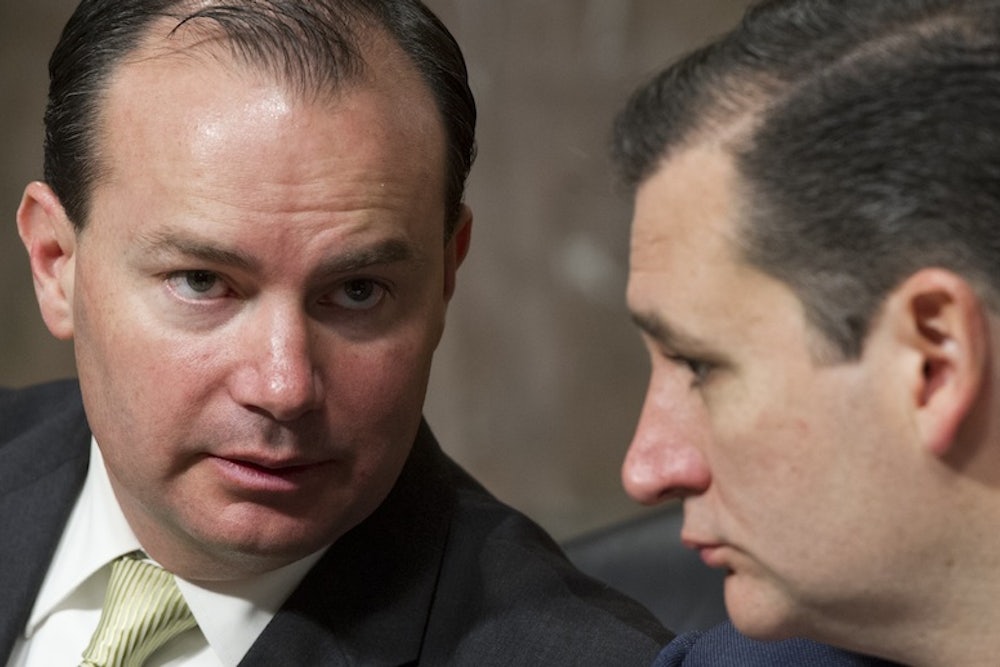After President Barack Obama gives the State of the Union address, there is traditionally a response from the opposing party. Last year, it was Senator Marco Rubio, but this year there are (so far) three separate responses: the official one, from Cathy McMorris Rodgers, a wildcat one from Rand Paul, and the Tea Party one from Senator Mike Lee of Utah.
Lee has emerged as perhaps the most important member of the Tea Party, which makes him one of the most important Republicans by default, since the central party leadership is extraordinarily, historically weak. A New York Times piece about the many State of the Union responses has an illustrative quote:
“There is no clear leadership in the Republican Party right now, no clear direction or message, and no way to enforce discipline,” said Mark McKinnon, a veteran Republican strategist who has become an outspoken critic of his party. “And because there’s a vacuum, and no shortage of cameras, there are plenty of actors happy to audition.”
Lee's prominence is due to three factors: the party's power vacuum, his extreme conservatism, and his earnest affect. The question for him, yet to be answered, is how serious he is about actual policy change—as compared to simply grabbing power and money for himself.
The other contender for leader of the Tea Party is Senator Ted Cruz. He is by all accounts extraordinarily intelligent, but so loathed by his peers that before he appeared on Chris Wallace's Fox News show other Republicans were feeding Wallace oppo research and begging him to give Cruz a thrashing. The upshot is that though Lee and Cruz were at least equally responsible for the disastrous strategy of shutting down the government last year, Cruz bore the brunt of the blame because had a higher profile and fewer friends. Just watch high priest of centrism Bob Schieffer laugh in Cruz's face when he refuses to admit fault.
Like Paul Ryan, Lee's radicalism comes in a friendly, nonaggressive form, which gets him relatively favorable media treatment compared to Cruz. But make no mistake: Lee is a reactionary every bit as much as Cruz. He's familiar with legal arguments, but the kind that end in declaring huge swathes of the federal government unconstitutional. As The New Republic reported in a 2010 profile:
He was personable and funny, poking fun at the president without erupting into the seething fury that comes to mind when most liberals think of the Tea Party movement. Only when he reached his conclusion did I step back and realize that he had just posited the unconstitutionality of the Democrats’ new health care bill, and a good number of federal agencies to boot, through a crafty and convincing discussion of the Commerce Clause. It sounded—at least in the moment—reasonable enough to me.
When you read Lee's recent speeches, there is a great deal of boilerplate conservatism, but also a few small nuggets of real policy meat. Before the Heritage Foundation last fall, for instance, he proposed cutting the prison population by releasing people who were no longer a threat. On another occasion, also before Heritage, he proposed not just an increased child tax credit, but also the benefits of infrastructure spending. Granted, he fudged how he'd pay for that—by cutting the gas tax nearly to zero, somehow?—but those two proposals are staunchly reformist by the far right's standards.
This shift away from hostage-taking politics was likely driven by fallout from the government shutdown: Lee's approval rating plummeted in Utah, which is heavily dependent on its national parks. Utah has long had a very different strain of conservatism compared to the South. It ranks highly in quality of governance, low in income inequality, and highly in social mobility. They've even got free housing for the homeless.
This makes the state an awkward base to launch a nihilistic Tea Party assault on the welfare state. To be sure, Utah is perhaps the most Republican state in the nation—Mitt Romney won it by almost 50 points. But while Utah conservatives loathe the Democrats, they don't stand for the kind of apocalyptic radicalism that Southern conservatives do. Anti-government rhetoric is all well and good, but when it results in tourists being turned away from Arches and Bryce, Utahns get pissed.
The test of where Lee really stands will come when and if there is another Republican president. Right now, Republicans are motivated primarily by their dislike of the president, but someday there will be no Democrats in the White House and the Republican base will go back to paying approximately zero attention to policy. At that point—assuming it comes during our lifetimes—Lee will have an opening to implement a new conservative agenda.
